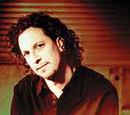>> write // ian froman: drums on bass
Ian Froman is at once an exciting and intense drummer always flowing and phrasing gracefully. He's certainly influenced the way I think of time playing both from a drumming and bass playing point of view. He teaches at the Drummers Collective in New York and at the Berklee College of Music in Boston.
Chris Trinidad: What influenced you to play the drums and not any other instrument?
Ian Froman: I originally played piano for a few years, but was really drawn to the drums at a very early age. I saw a jazz band when I was in grade school and the drummer really made an impression on me. My cousin later bought a snare drum and I got it after he tired of it. At 13 years of age, I purchased my first drumset.
CT: Who would you consider to be your primary influences on the drums? And of these players, how has their playing influenced your approach?
Ian: I first heard Steve Gadd and knew that the drums were something special. His time feel and the way he played the tune were really unique. Then Jack DeJohnette became a major influence and still remains one ... I like the way he phrases and plays with the rhythm, both during the melody and solos.
CT: You have also been fortunate to have studied with Elvin Jones. How has studying with him affected your playing and what are some of the things that you have picked while studying with him?
Ian: Studying with Elvin was truly a treat, something that I would like to do now! I was always into his playing, so being in a room with him and talking about 'Trane and that style of drumming allowed me to check out the style from the source. The lessons were very conceptual and I have really taken that approach to my own private teaching.
CT: You have mentioned before that you did not wish to play with the hi-hat on two and four and the standard 'ding ding a ding' ride pattern? What made you arrive at this decision?
Ian: I never wanted to be restricted by any repeated pattern. I think that true creative improvisation needs to be a continuous flow of rhythmic ideas and playing something over and over again, does not allow that to happen. The ride cymbal can give you pulse but can also begin the phrasing process and play specific rhythms. As far as the hi-hat is concerned, I really like to use the hi-hat as a phrasing voice, not just something that repeats an ostinato thus removing it from rhythmic improv.
CT: To get to the point where one is able to phrase freely requires quite a bit of independence. How do you feel one would best achieve this? Sequential learning and using texts? Playing along to records?
Ian: I think that to gain independence and coordination on the drumset you must do a variety of existing exercises that most drummers have done: stick control and syncopation (as applied to the set). You have to learn to coordinate a number of rhythms, specifically quarters and eighths against the ride pattern. Playing along with records is cool but does not promote this independence work.
CT: What are your thoughts on playing traditional bebop with an acoustic bassist? Do you have a preference on working with acoustic or electric players?
Ian: I much prefer playing traditional bebop with acoustic bass. The sound and the attack is better suited for that music, but there are many great electric bassists today who know how to walk correctly and play great jazz! I think that I just need to play with a very good bassist regardless of it being acoustic or electric.
CT: Would you feel then, that the traditional role of the timekeeper would fall to the bassist? Or do you think that time is implied through the interaction of the players?
Ian: The time keeper of the band is the drummer. Nobody can dictate tempo like the drums. The nature of the instrument is so strong that the drummer really leads with regard to tempo and dynamics too.
CT: Certainly there have been situations when you get called to play with a bassist you haven't played with before. What kind of things do you look out for? What kind of things do you expect?
Ian: The first thing that I notice is time feel. I want to know where the beats lies. Is it behind, in the middle or on top? I want to get a rapport going fast so we can hook up and play well together.


